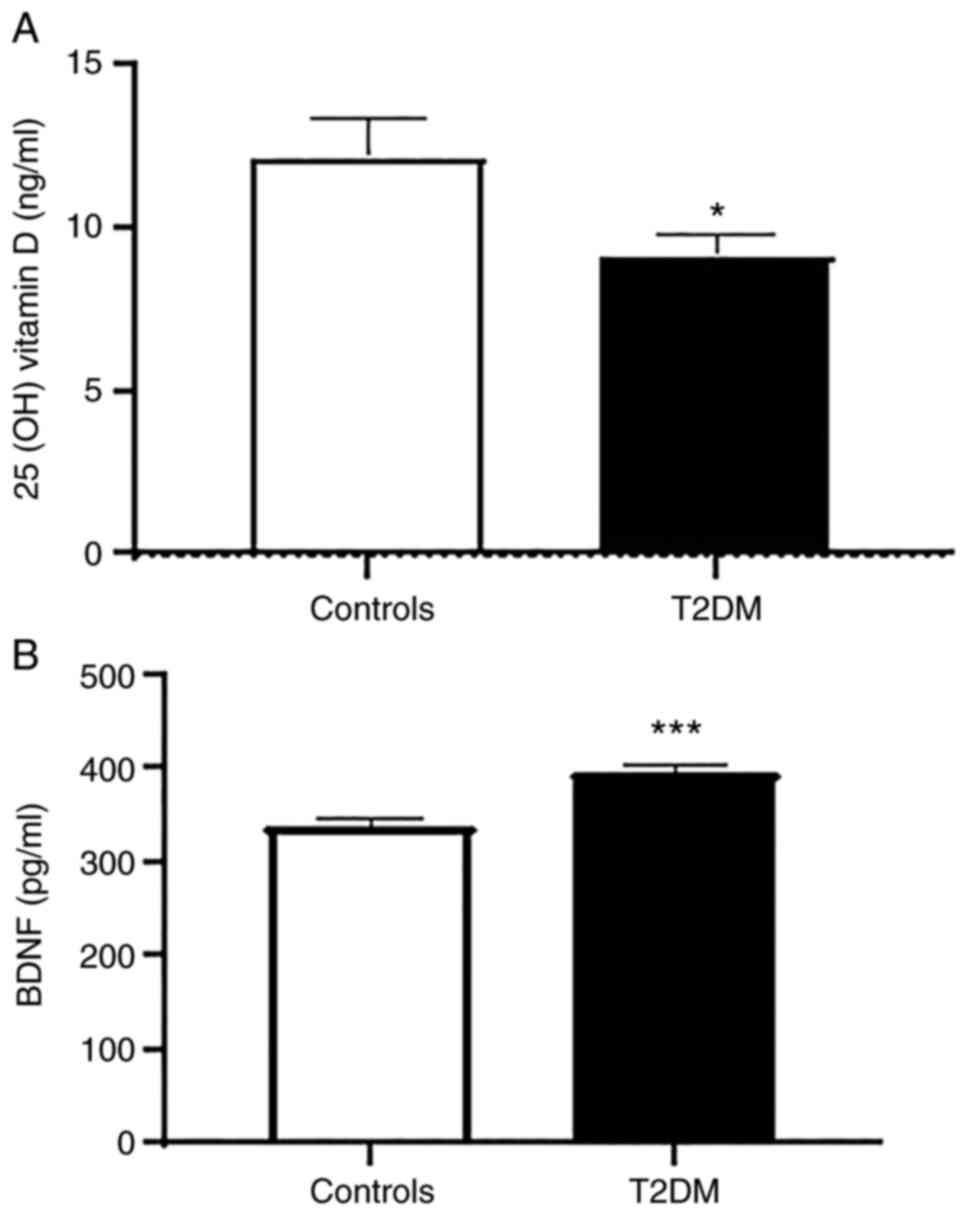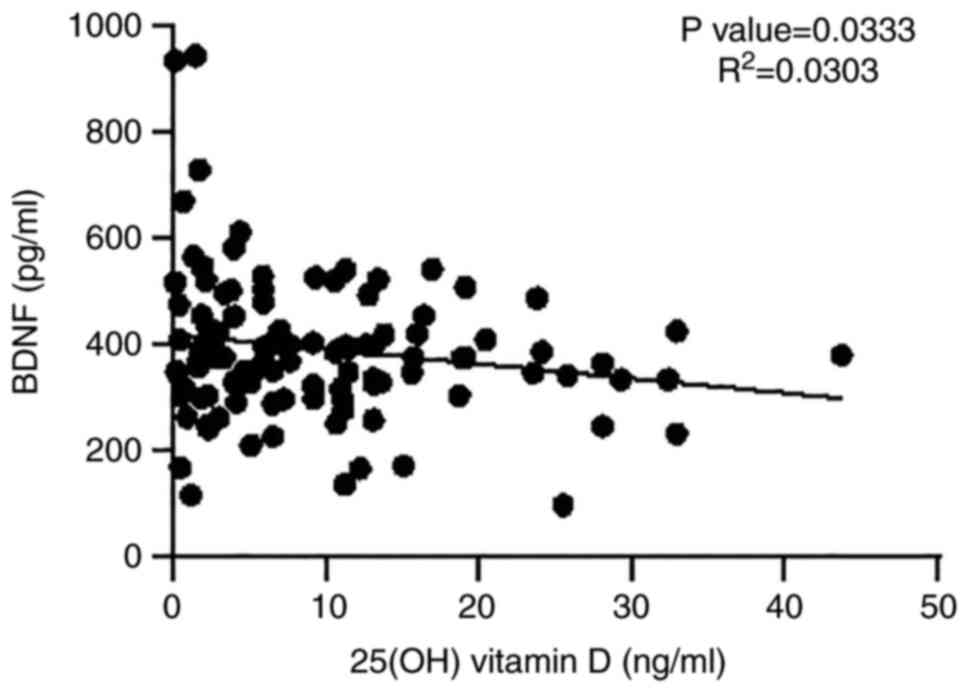|
1
|
American Diabetes Association. 2.
Classification and diagnosis of diabetes: Standards of medical care
in diabetes-2019. Diabetes Care. 42 (Suppl 1):S13–S28.
2019.PubMed/NCBI View Article : Google Scholar
|
|
2
|
Elmarakby AA and Sullivan JC: Relationship
between oxidative stress and inflammatory cytokines in diabetic
nephropathy. Cardiovasc Ther. 30:49–59. 2012.PubMed/NCBI View Article : Google Scholar
|
|
3
|
Galicia-Garcia U, Benito-Vicente A, Jebari
S, Larrea-Sebal A, Siddiqi H, Uribe KB, Ostolaza H and Martín C:
Pathophysiology of type 2 diabetes mellitus. Int J Mol Sci.
21(6275)2020.PubMed/NCBI View Article : Google Scholar
|
|
4
|
Scheithauer TPM, Rampanelli E, Nieuwdorp
M, Vallance BA, Verchere CB, van Raalte DH and Herrema H: Gut
microbiota as a trigger for metabolic inflammation in obesity and
type 2 diabetes. Front Immunol. 11(571731)2020.PubMed/NCBI View Article : Google Scholar
|
|
5
|
Xiao J, Li J, Cai L, Chakrabarti S and Li
X: Cytokines and diabetes research. J Diabetes Res.
2014(920613)2014.PubMed/NCBI View Article : Google Scholar
|
|
6
|
Oguntibeju OO: Type 2 diabetes mellitus,
oxidative stress and inflammation: Examining the links. Int J
Physiol Pathophysiol Pharmacol. 11:45–63. 2019.PubMed/NCBI
|
|
7
|
Cho NH, Ku EJ, Jung KY, Oh TJ, Kwak SH,
Moon JH, Park KS, Jang HC, Kim YJ and Choi SH: Estimated
association between cytokines and the progression to diabetes:
10-year follow-up from a community-based cohort. J Clin Endocrinol
Metab. 105:e381–e389. 2020.PubMed/NCBI View Article : Google Scholar
|
|
8
|
Marie C, Pedard M, Quirie A, Tessier A,
Garnier P, Totoson P and Demougeot C: Brain-derived neurotrophic
factor secreted by the cerebral endothelium: A new actor of brain
function? J Cereb Blood Flow Metab. 38:935–949. 2018.PubMed/NCBI View Article : Google Scholar
|
|
9
|
Shi SS, Shao SH, Yuan BP, Pan F and Li ZL:
Acute stress and chronic stress change brain-derived neurotrophic
factor (BDNF) and tyrosine kinase-coupled receptor (TrkB)
expression in both young and aged rat hippocampus. Yonsei Med J.
51:661–671. 2010.PubMed/NCBI View Article : Google Scholar
|
|
10
|
Jiang Y, Wei N, Zhu J, Lu T, Chen Z, Xu G
and Liu X: Effects of brain-derived neurotrophic factor on local
inflammation in experimental stroke of rat. Mediators Inflamm.
2010(372423)2010.PubMed/NCBI View Article : Google Scholar
|
|
11
|
Manni L, Nikolova V, Vyagova D, Chaldakov
GN and Aloe L: Reduced plasma levels of NGF and BDNF in patients
with acute coronary syndromes. Int J Cardiol. 102:169–171.
2005.PubMed/NCBI View Article : Google Scholar
|
|
12
|
Li B, Lang N and Cheng ZF: Serum levels of
brain-derived neurotrophic factor are associated with diabetes
risk, complications, and obesity: A cohort study from Chinese
patients with type 2 diabetes. Mol Neurobiol. 53:5492–5499.
2016.PubMed/NCBI View Article : Google Scholar
|
|
13
|
Al-Qudah M, Shammala DA, Al-Dwairi A,
Al-Shboul O and Mustafa AG: Dextran sodium sulphate (DSS)-induced
colitis alters the expression of neurotrophins in smooth muscle
cells of rat colon. Physiol Res. 66:1009–1020. 2017.PubMed/NCBI View Article : Google Scholar
|
|
14
|
Al Qudah M, Alfaqih M, Al-Shboul O, Saadeh
R and Al-Dwairi A: Effect of cytokine treatment on the expression
and secretion of brain derived neurotrophic factor in the smooth
muscle of the rat colon. Biomed Rep. 13:55–60. 2020.PubMed/NCBI View Article : Google Scholar
|
|
15
|
Krabbe KS, Nielsen AR, Krogh-Madsen R,
Plomgaard P, Rasmussen P, Erikstrup C, Fischer CP, Lindegaard B,
Petersen AM, Taudorf S, et al: Brain-derived neurotrophic factor
(BDNF) and type 2 diabetes. Diabetologia. 50:431–438.
2007.PubMed/NCBI View Article : Google Scholar
|
|
16
|
Jin H, Chen Y, Wang B, Zhu Y, Chen L, Han
X, Ma G and Liu N: Association between brain-derived neurotrophic
factor and von Willebrand factor levels in patients with stable
coronary artery disease. BMC Cardiovasc Disord.
18(23)2018.PubMed/NCBI View Article : Google Scholar
|
|
17
|
Kermani P and Hempstead B: BDNF actions in
the cardiovascular system: Roles in development, adulthood and
response to injury. Front Physiol. 10(455)2019.PubMed/NCBI View Article : Google Scholar
|
|
18
|
Cho HJ, Kim SY, Park MJ, Kim DS, Kim JK
and Chu MY: Expression of mRNA for brain-derived neurotrophic
factor in the dorsal root ganglion following peripheral
inflammation. Brain Res. 749:358–362. 1997.PubMed/NCBI View Article : Google Scholar
|
|
19
|
Giustina A, Adler RA, Binkley N,
Bollerslev J, Bouillon R, Dawson-Hughes B, Ebeling PR, Feldman D,
Formenti AM, Lazaretti-Castro M, et al: Consensus statement from
2nd International conference on controversies in vitamin D. Rev
Endocr Metab Disord. 21:89–116. 2020.PubMed/NCBI View Article : Google Scholar
|
|
20
|
Calton EK, Keane KN, Newsholme P and
Soares MJ: The impact of vitamin D levels on inflammatory status: A
systematic review of immune cell studies. PLoS One.
10(e0141770)2015.PubMed/NCBI View Article : Google Scholar
|
|
21
|
Ojaimi S, Skinner NA, Strauss BJ,
Sundararajan V, Woolley I and Visvanathan K: Vitamin D deficiency
impacts on expression of toll-like receptor-2 and cytokine profile:
A pilot study. J Transl Med. 11(176)2013.PubMed/NCBI View Article : Google Scholar
|
|
22
|
Krishnan AV and Feldman D: Mechanisms of
the anti-cancer and anti-inflammatory actions of vitamin D. Annu
Rev Pharmacol Toxicol. 51:311–336. 2011.PubMed/NCBI View Article : Google Scholar
|
|
23
|
George PS, Pearson ER and Witham MD:
Effect of vitamin D supplementation on glycaemic control and
insulin resistance: A systematic review and meta-analysis. Diabet
Med. 29:e142–e150. 2012.PubMed/NCBI View Article : Google Scholar
|
|
24
|
Nadimi H, Djazayery A, Javanbakht MH,
Dehpour A, Ghaedi E, Derakhshanian H, Mohammadi H, Mousavi SN and
Djalali M: Effect of vitamin D supplementation on CREB-TrkB-BDNF
pathway in the hippocampus of diabetic rats. Iran J Basic Med Sci.
23:117–123. 2020.PubMed/NCBI View Article : Google Scholar
|
|
25
|
Khairy EY and Attia MM: Protective effects
of vitamin D on neurophysiologic alterations in brain aging: Role
of brain-derived neurotrophic factor (BDNF). Nutr Neurosci.
24:650–659. 2021.PubMed/NCBI View Article : Google Scholar
|
|
26
|
Chamberlain JJ, Johnson EL, Leal S,
Rhinehart AS, Shubrook JH and Peterson L: Cardiovascular disease
and risk management: Review of the American diabetes association
standards of medical care in diabetes 2018. Ann Intern Med.
168:640–650. 2018.PubMed/NCBI View
Article : Google Scholar
|
|
27
|
Tsalamandris S, Antonopoulos AS, Oikonomou
E, Papamikroulis GA, Vogiatzi G, Papaioannou S, Deftereos S and
Tousoulis D: The role of inflammation in diabetes: Current concepts
and future perspectives. Eur Cardiol. 14:50–59. 2019.PubMed/NCBI View Article : Google Scholar
|
|
28
|
Kolb H and Martin S:
Environmental/lifestyle factors in the pathogenesis and prevention
of type 2 diabetes. BMC Med. 15(131)2017.PubMed/NCBI View Article : Google Scholar
|
|
29
|
Al-Qudah M, Shammala DA, Al-Dwairi A and
Al-Shboul O: Differential expression of neurotrophins in
(DSS)-induced colitis in smooth muscle of rat colon. J Teknologi.
78 (5-5):2016.
|
|
30
|
Rozanska O, Uruska A and
Zozulinska-Ziolkiewicz D: Brain-derived neurotrophic factor and
diabetes. Int J Mol Sci. 21(841)2020.PubMed/NCBI View Article : Google Scholar
|
|
31
|
Faria MC, Gonçalves GS, Rocha NP, Moraes
EN, Bicalho MA, Gualberto Cintra MT, Jardim de Paula J, José Ravic
de Miranda LF, Clayton de Souza Ferreira A, Teixeira AL, et al:
Increased plasma levels of BDNF and inflammatory markers in
Alzheimer's disease. J Psychiatr Res. 53:166–172. 2014.PubMed/NCBI View Article : Google Scholar
|
|
32
|
Borba EM: Association of two levels of
BDNF (brain derived neurotrophic factor) no mild cognitive
impairment and Alzheimer's disease (unpublished PhD thesis).
Federal University of Rio Grande do Sul, 2012.
|
|
33
|
Zilliox LA, Chadrasekaran K, Kwan JY and
Russell JW: Diabetes and cognitive impairment. Curr Diab Rep.
16(87)2016.PubMed/NCBI View Article : Google Scholar
|
|
34
|
Angelucci F, Spalletta G, di Iulio F,
Ciaramella A, Salani F, Colantoni L, Varsi AE, Gianni W, Sancesario
G, Caltagirone C and Bossù P: Alzheimer'S disease (AD) and mild
cognitive impairment (MCI) patients are characterized by increased
BDNF serum levels. Curr Alzheimer Res. 7:15–20. 2010.PubMed/NCBI View Article : Google Scholar
|
|
35
|
Babaei P, Shirkouhi SG, Hosseini R and
Soltani Tehrani B: Vitamin D is associated with metabotropic but
not neurotrophic effects of exercise in ovariectomized rats.
Diabetol Metab Syndr. 9(91)2017.PubMed/NCBI View Article : Google Scholar
|
|
36
|
Neveu I, Naveilhan P, Baudet C, Brachet P
and Metsis M: 1,25-dihydroxyvitamin D3 regulates NT-3, NT-4 but not
BDNF mRNA in astrocytes. Neuroreport. 6:124–126. 1994.PubMed/NCBI View Article : Google Scholar
|
|
37
|
Kulaksizoglu S and Kulaksizoglu B: The
relationship between metabolic syndrome, BDNF, and vitamin D in
patients with schizophrenia. Neurochem. J. 11:104–111. 2017.
|
|
38
|
Seyedi M, Gholami F, Samadi M, Djalali M,
Effatpanah M, Yekaninejad MS, Hashemi R, Abdolahi M, Chamari M and
Honarvar NM: The effect of vitamin D3 supplementation on serum
BDNF, dopamine, and serotonin in children with
attention-deficit/hyperactivity disorder. CNS Neurol Disord Drug
Targets. 18:496–501. 2019.PubMed/NCBI View Article : Google Scholar
|
|
39
|
Pozzi F, Frajese GV and Frajese G: Vitamin
D (Calcifediol) supplementation modulates NGF and BDNF and improves
memory function in postmenopausal women: A pilot study.
Endocrinology. 2013:1–11. 2013.
|
















